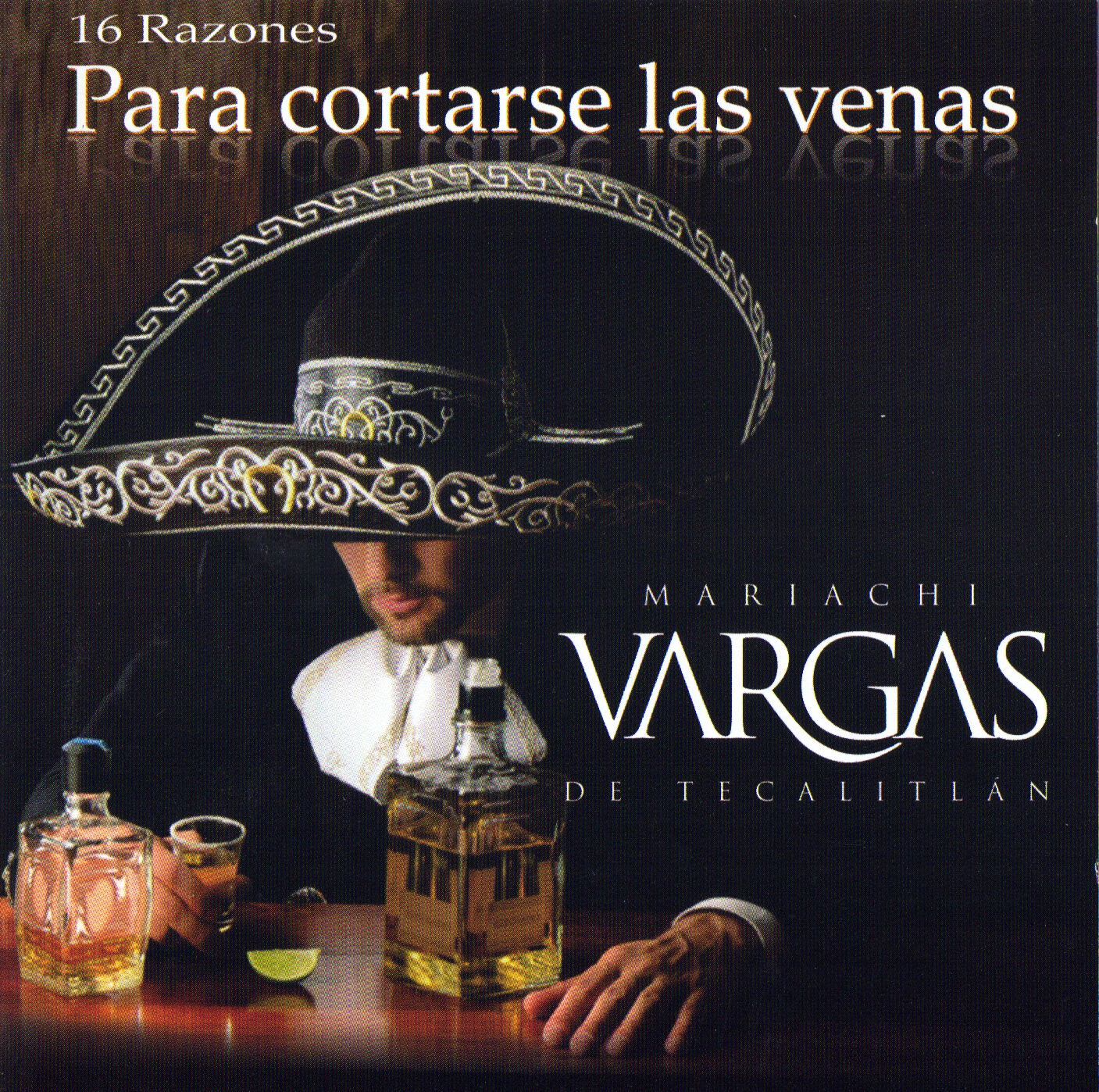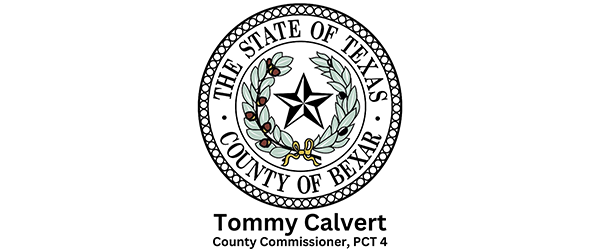Mariachi Vargas de Tecalitlán’s recently-released 16 Razones Para Cortarse las Venas marks a welcome return to tradition on the part of this time-honored group that has for many years interpreted a wide variety of popular and international genres in addition to the music of its roots.
The 16 songs on this CD represent a wide and well-selected variety of songwriters and genres, and range from canción mexicana to vals criollo to canción ranchera, with a couple of boleros and a balada thrown in for good measure. The unifying theme of this collection is el desamor—love gone sour. Every song is about subjects like unrequited love, unattainable love, failed relationships, heartbreak, jealousy, revenge, and drowning one’s sorrows in liquor.
The album’s title, 16 Razones Para Cortarse las Venas, is disconcerting to some when literally translated. The saying “me corto las venas,” however, is rarely taken literally, being used mainly as an expression of frustration or despair. The album’s title is a reminder that love is capable of inducing heightened emotional states that can cause extreme behavior. One of these songs, José Alfredo Jiménez’s “Declárate Inocente,” contains the line: “Préndeme fuego si quieres que te olvide; méteme tres balazos en la frente.” (“Burn me alive if you want me to forget you; shoot me three times in the forehead.”) Lucha Villa would sometimes preface her live performances of this song with the disclaimer, “We Mexicans tend to be rather exaggerated in our emotions!”
Mariachi Vargas’ general director, Rubén Fuentes, personally selected all the material as well as producing and directing the album. This recording bears his stamp to a greater degree than any other Vargas album in recent history, and stands as a monument to the maestro’s incomparable talent and musical influence. While few would dispute Fuentes’ stature as the most important musical figure in the history of mariachi music, what surprises many is his sustained level of artistic activity at the age of 89. All but four tracks on this CD are original Fuentes arrangements, and the title song is a brand new Fuentes composition.
Most of the tracks on this album represent remakes of original Rubén Fuentes arrangements found on classic recordings (see track information below). In some cases, the maestro has incorporated aspects of more than one previous recording, but none are exact copies, as he always changes musical details as the inspiration of the moment moves him. “I always prepare what I’m going to record ahead of time, but this always changes once I get into the studio,” Fuentes once explained to me.
This album gives a historical overview of some of the highlights of the golden era of mariachi music, featuring outstanding compositions by some of that period’s greatest authors. Two early songwriters of that era were Agustín Lara and Felipe Valdés Leal. Best known for his more exotic works, Lara isn’t usually remembered as a writer of canciones rancheras, yet his “Se Me Hizo Fácil,” the CD’s opening track, is undoubtedly a ranchera classic. The other early canción ranchera featured here, Valdés Leal’s “Tú, Sólo Tú,” is considered one of the most popular Mexican songs of all time.
Mariachi music truly came of age in the 1950s and ’60s. Tomás Méndez’s “Puñalada Trapera,” Cuco Sánchez’s “Fallaste Corazón,” and José Alfredo Jiménez’s “Cuando el Destino” and “Declárate Inocente,” all of which were written during those two decades, are some of the greatest rancheras of all time.
“Que Nadie Sepa Mi Sufrir,” by the Argentinian duo of Ángel Amato and Enrique Dizeo, and “Amor Ajeno” by Rubén Fuentes are outstanding examples of Peruvian-style waltzes or valses criollos.
Both Rubén Fuentes’ “Vieras Cuántas Ganas Tengo,” and José Luis Almada’s “Pena de Amores” were composed around 1980. Although maestro Fuentes classifies both as canciones mexicanas, they represent two distinct subdivisions of that genre, since the former is a modernistic piece featuring complex rhythms and lush, impressionistic harmonies, while the latter is composed in an early twentieth-century danza style. “Vieras Cuántas Ganas Tengo” was written specifically for the sensibilities of Lucha Villa, while “Pena de Amores” was chosen by Fuentes especially for Linda Ronstadt.
“La Diferencia,” “Por Tu Maldito Amor,” “Lástima Que Seas Ajena,” and “¿De Qué Manera te Olvido?” are the only arrangements on this CD that are not Fuentes originals. On these, the maestro chose to retain most of the features of the classic, original hit recordings by other well-known arrangers, while adding a bit of his own personal touch.
Lastly, in a concession to youth and non-mariachi audiences, maestro Fuentes included Marco Antonio Solís’s popular balada “Tu Cárcel,” in an arrangement that he originally made for Lucero.
The quality of this latest Mariachi Vargas release is consistently high. The group’s current generation has one of the finest vocal lineups in its 117-year history, and all of the vocal performances—solo, duet, and trio—are excellent, as are the instrumental performances. Remakes of two songs that Pepe Martínez Jr. and Arturo Vargas recorded over a decade ago—“Amor Ajeno” and “Que Nadie Sepa Mi Sufrir”—demonstrate how these singers have refined and perfected their vocal art during their tenure with Mariachi Vargas.
In summary, 16 Razones Para Cortarse las Venas is one of the finest CDs that Mariachi Vargas has released in years, and an album that virtually every mariachi fan will want to own. It’s a record one can listen to over and over again and not grow tired of.
—Jonathan Clark
Note: This album will eventually be available on digital media distributors like iTunes, Amazon.com, etc., but for the time being, you’ll have to attend a Mariachi Vargas concert—where you’ll hear many of these songs performed live—to acquire the compact disc. Another option is to e-mail mvargascd@hotmail.com and ask them to ship you a CD.
TRACK INFORMATION
1. Se Me Hizo Fácil canción ranchera
Vocals: Manuel Alcaraz, Carlos Martínez, and Andrés González
Author: Agustín Lara (1897-1970)
Arrangement: Rubén Fuentes
Previous recordings with Mariachi Vargas: Dueto Agustín Lara y Pedro Vargas (1953), Los Tres Ases (1958)
2. La Diferencia canción ranchera
Vocals: Pepe Martínez Jr. and Carlos Martínez
Author: Juan Gabriel (1950-)
Original arrangements: Eduardo Magallanes, Pedro Ramírez
Previous recordings: Juan Gabriel (1980), Vicente Fernández (1982)
3. Vieras Cuántas Ganas Tengo canción mexicana
Vocal: Daniel Martínez
Author: Rubén Fuentes (1926-)
Arrangement: Rubén Fuentes
Previous recordings with Mariachi Vargas: Lucha Villa (1980 & 1984), Fernando de la Mora (2009)
4. Que Nadie Sepa Mi Sufrir vals criollo
Vocal: Arturo Vargas
Authors: music: Ángel Amato (1911-1997); lyrics: Enrique Dizeo
Arrangement: Rubén Fuentes
Previous recordings: Los Tres Reyes (1959), Julio Jaramillo (1967), etc.
Previous recording with Mariachi Vargas: Arturo Vargas (2003)
5. Por Tu Maldito Amor canción ranchera
Vocal: Alberto Alfaro
Author: Federico Méndez (1933-1988)
Original arrangement: Rigoberto Alfaro
Previous recording: Vicente Fernández (1989)
6. Me Corto Las Venas canción ranchera
Vocals: Carlos Martínez and Arturo Vargas
Author: Rubén Fuentes (1926-)
Arrangement: Rubén Fuentes
(Debut recording for this CD)
7. Lástima Que Seas Ajena bolero
Vocal: Andrés González
Author: Jorge Massías (1948-2015)
Original arrangement: Pedro Ramírez
Previous recording: Vicente Fernández (1993)
8. Puñalada Trapera canción ranchera
Vocal: Manuel Alcaraz
Author: Tomás Méndez (1927-1995)
Arrangement: Rubén Fuentes
Previous recordings with Mariachi Vargas: Lola Beltrán (1954), Amalia Mendoza (1954), Fernando de la Mora (2005)
9. Amor Ajeno vals criollo
Vocal: Pepe Martínez Jr.
Author: Rubén Fuentes (1926-)
Arrangement: Rubén Fuentes
Previous recordings with Mariachi Vargas: Marco Antonio Muñiz (1999), Mariachi Vargas de Tecalitlán (1999), Fernando de la Mora (2009)
10. Cuando el Destino canción ranchera
Vocal: Daniel Martínez
Author: José Alfredo Jiménez (1926-1973)
Arrangement: Rubén Fuentes (1926-)
Previous recordings with Mariachi Vargas: Miguel Aceves Mejía (1951), Lola Beltrán (1951), Pedro Infante (1951), José Alfredo Jiménez (1951 & 1962), Amalia Mendoza (1963)
11. ¿De Qué Manera te Olvido? bolero
Vocal: Andrés González
Author: Federico Méndez (1933-1988)
Original arrangement: Rigoberto Alfaro
Original recording: Vicente Fernández (1980)
Previous recording with Mariachi Vargas: Dyango (2000)
12. Tú, Sólo Tú canción ranchera
Vocals: Manuel Alcaraz and Daniel Martínez
Author: Felipe Valdés Leal (1899-1988)
Arrangement: Rubén Fuentes
Previous recordings with Mariachi Vargas: Miguel Aceves Mejía (1949), Linda Ronstadt (1987)
13. Declárate Inocente canción ranchera
Vocal: Carlos Martínez
Author: José Alfredo Jiménez (1926-1973)
Arrangement: Rubén Fuentes
Previous recordings with Mariachi Vargas: Lola Beltrán (1965) José Alfredo Jiménez (1965), Lucha Villa (1965)
14. Pena de Amores canción mexicana
Vocals: Arturo Vargas and Pepe Martínez Jr.
Author: José Luis Almada
Arrangement: Rubén Fuentes
Previous recording with Mariachi Vargas: Linda Ronstadt (1991)
15. Fallaste, Corazón canción ranchera
Vocal: Alberto Alfaro
Author: Cuco Sánchez (1921-2000)
Arrangement: Rubén Fuentes
Previous recording with Mariachi Vargas: Amalia Mendoza (1963)
16. Tu Cárcel balada
Vocal: Manuel Alcaraz
Author: Marco Antonio Solís (1959-)
Arrangement: Rubén Fuentes
Previous recording with Mariachi Vargas: Lucero (1990)
16 Razones Para Cortarse las Venas was recorded between June 15-25, 2015 at Joél Solís Studios in Mexico City.







Well done, Jonathan Clark. Thanks for sharing!
This is an excellent album! I couldn’t agree more with my friend Jonathan. I highly recommend that you get this ASAP…
First of all, saludos, Maestro Jonathan Clark. It’s always a pleasure to read your blogs. The extended research you do is breathtaking. I feel you give us all that little extra we miss and need to be aware of. Thank you unconditionally.
This CD is and sounds amazing!! Plan to hear Vargas live to capture the true essence of mariachi and what they give to us.
Knowing the involvement of Maestro Ruben Fuentes gives us that tingle of excitement that should always be present while listening to mariachi music.
¡Que Viva la Musica del Mariachi!
Artísticamente,
Cassandra~
Thank you, Jonathan Clark, for bringing us the best in the mariachi world. Your blogs and information are always so informative.
This CD is amazing for many reasons, and the information on every song title is greatly appreciated.
The involvement of Maestro Rubén Fuentes is sensational, and what an honor…
¡¡¡Que Viva el Mariachi siempre!!!
Artísticamente,
Cassandra~
Excellent review, Jonny. Now I just have to find a way to hear them in person. I would certainly buy it based on your review. Especially if this one has a lot of Rubén Fuentes influence. :))
Jonny, I love your comments as much as I love the music and this return to a traditional sound. I agree that it is too bad these recordings are so difficult to obtain. They merit a much wider audience! Your comments give a lot of insight, particularly for those who may not be as familiar with the music of Mariachi Vargas, while adding details that interest many of us who are long-time fans.
Una reseña profesionalmente redactada con análisis del desarrollo del mariachi, su estilo y su música.
How many times do I have to be completely blown away from your knowledge about this mariachi? I just saw Cynthia’s blurb about the new recording and tried to get it as a download, and then I find out it is not available yet, but that someone has already previewed it and subsequently written a very interesting thesis about it. Oh yeah! Maybe Jonathan Clark has heard it… How could that be? HA! After reading what you said and seeing that it contains some of my favorite songs ever, I must get it.
Thank you, Jonathan. Thank you for all you do for my love of this music and for what you have done in the past for all of us. I’ll get this damn album, and I know I will appreciate all it has to offer. Keep up your treasured efforts in all these pursuits.
Your friend, Jim J